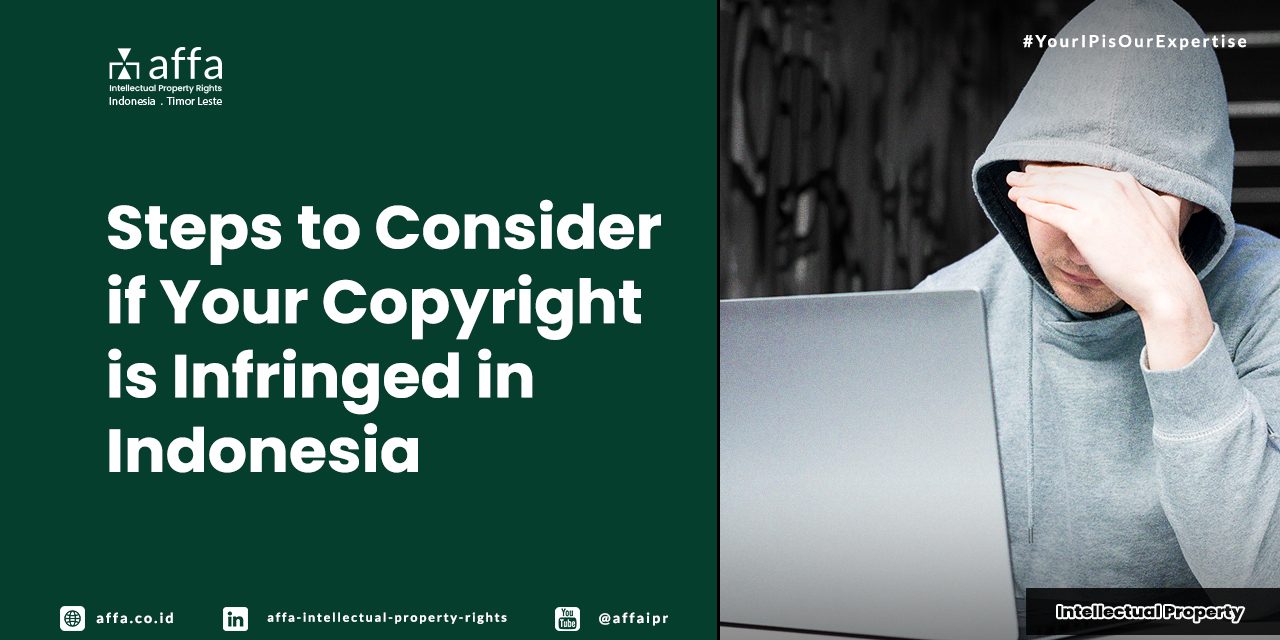To date, Indonesia is still considered as a “hot bed” for Copyright infringements. Many infringements vary from petty ones to the heavily industrialised ones. Copyrights are protected under the Law No. 28 Year 2014 on Copyrights and by definition, a (Copyright) Creation is any creative work in the fields of science, art, and literature that is produced based on inspiration, ability, thought, imagination, dexterity, skill or expertise expressed in tangible form. A Creator is a person or several people who produce a Creation. Meanwhile, the Copyright Holder is the Creator or other party, including a company that is also given the right by the Creator to obtain Exclusive Rights and economic benefits from a Creation.
Therefore, if another party benefits from a work without permission from the Copyright Holder, it can be categorized as a Copyright infringement. In particular, piracy activities also have the meaning clearly stated in Article 1 of the Copyright Law, namely the illegal duplication of works and/or related rights products and the widespread distribution of goods resulting from such duplication to obtain economic benefits.
Because economic benefits are the Copyright Holder’s exclusive right and infringement is still widespread in the modern era, if you are a Creator or Copyright Holder, you need to understand your rights and know what you can do when your work is pirated in Indonesia.
Record Your Creation before the Copyright Office under the DIrectorate General of Intellectual Property (DGIP)
Copyright protection is granted automatically from the time the copyrighted work is produced. This is different from other Intellectual Property, such as Trademarks and Patents, which must be registered first to obtain protection. Therefore, the term used to register copyright with the Directorate General of Intellectual Property (DGIP)—Ministry of Law and Human Rights (Kemenkumham) is “recordation.”
Hence, no recordation is required to prosecute or file a lawsuit against a party deemed to have violated Copyright. However, suppose there is a dispute regarding Copyright ownership of a work. In that case, a work recordation letter issued by the Minister, in this case the DGIP, and recorded in the General Register of Works is initial proof of ownership of a work and is substantial evidence in court.
Prioritize Mediation, Amicable Settlements, Before Pursuing Criminal Charges
Article 95 Paragraph (4) of the Copyright Law stipulates that Copyright violations, including piracy, must take mediation before making criminal charges.
So if you find that your work has been pirated, you can give an informal warning first, followed by a warning letter, if you don’t get a response.
Contents of the Warning Letter:
In general, there are no standard rules governing the contents of a warning letter, but it must clearly describe the following 5 (five) things:
- Intended party;
- The problem being addressed;
- The demands of the sender, which the recipient must implement;
- Legal basis and legal standing of the sender; and
- The period for demands must be met.
Violations in Social Media/E-Commerce
Piracy is rampant on various social media and e-commerce platforms in the internet era. Technically, each platform also provides a complaint service if pirated goods are found. If you find Trademarks or Copyrights being bought and sold there without permission, you can start from the self-report system or go to the particular page provided.
In general, you need to prepare the following 3 (three) things if your report is to be followed up:
- Proof of ownership of the work in the form of a work recordation letter issued by the Ministry of Law and Human Rights, a statement of work ownership signed by you, or a similar document;
- Proof of your identity (ID card, driving license, passport, or similar); and
- Power of attorney from the Copyright Holder by the document proving ownership of the work you attached (if you are not the owner of the Copyright but are the recipient of the power of attorney from the Copyright owner to make a report).
You might also want to read:
Tackling Counterfeiters on Indonesian E-Commerce Sites
Suppose pirates or platforms ignore your warning. In that case, you need to engage an experienced Intellectual Property Consultant who can provide further advice so that piracy activities from other parties can be stopped immediately or proceed with criminal prosecution at the Commercial Court.
Violations By Fellow Creators
A problem that also often occurs in Copyright disputes is disputes between Creators who claim they have the right to get more than others. For example, a comic was created jointly by an illustrator, a colorist, and a writer. If, in the future, the writer feels that his share is smaller, he might claim his rights. There was also a case that went viral in which a band was subpoenaed and prohibited from performing songs by writers who had left the band.
That is where the critical role of copyright recording with DGIP is to avoid disputes that may arise in the future between creators. In the Copyright Recordation, which is then included in the DGIP General Register of Creations, you can consist of all existing Creators. But again, mediation is still the most recommended route before trial.
Furthermore, you can also register a License Agreement for the work you own because it is possible for you, as the Creator of a character, to need vendors or other parties interested in getting economic benefits from your creation. For example, suppose a t-shirt or toy manufacturer is interested in commercializing your work in massive quantities and distributing it throughout Indonesia. In that case, you need to make a clear License Agreement that details how much royalties or profit sharing scheme you will get and register the agreement with DGIP as a firm grip in case of default or dispute in the future.
You might also want to read:
Unveiling Copyright Ownership in the Film Industry: Legal Perspectives
Should you need more information about Copyright protection in Indonesia, don’t hesitate to contact us at [email protected].







